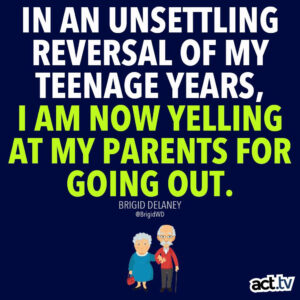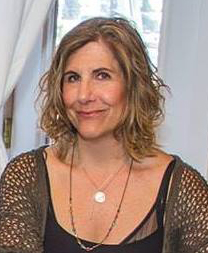That moment you realize your “kids” are parenting you…
 The other day, I was on the phone with my friend Shellie. Shellie and her husband Rick are dear friends and our kids went to school together. Hearing her voice always lifts my spirits and I needed that more than ever last week. She makes me laugh every time we talk. She told me she recently got a call from her oldest son, who was checking in to make sure they were doing okay and that they were being careful to avoid COVID-19 exposure. The next day, Shellie got a call from her second son, also checking in and making sure she and Rick were doing okay and being careful. When her daughter called the day after, a thought occurred to her.
The other day, I was on the phone with my friend Shellie. Shellie and her husband Rick are dear friends and our kids went to school together. Hearing her voice always lifts my spirits and I needed that more than ever last week. She makes me laugh every time we talk. She told me she recently got a call from her oldest son, who was checking in to make sure they were doing okay and that they were being careful to avoid COVID-19 exposure. The next day, Shellie got a call from her second son, also checking in and making sure she and Rick were doing okay and being careful. When her daughter called the day after, a thought occurred to her.
“Wait a minute…are you guys on rotation to check in on us?”
Then she realized, “Oh my gosh, we’ve become the aging parents and they’re worried about us!”.
We were laughing and also touched by the sweetness of their concern. It feels upside-down. Note that Shellie is the Clinical Health Supervisor for North Central Public Health District in Oregon, so her kids are a little extra concerned. Their family is very close, so checking in isn’t that unusual, but we were laughing at the realization that our adult kids are starting to parent us.
Why should we be surprised?
Like me, many of my friends are familiar with caring for aging parents. My 80-year-old dad asks me to sit on his right side so he can hear me better when I’m lecturing him(!). Worrying about and caring for our aging parents is something many of us face, and it’s a little more intense right now. It’s also surreal when you realize you’re slipping into the aging parents category yourself!
Our responsible adult children
Our daughter Presley is always joking that our social life is busier than hers. We’ve been getting lectures from her about taking the “stay home” recommendations seriously, and we are. She and her boyfriend Kiel won’t come over for dinner anymore — or even step inside our house. Even though they are being careful, they realize we are in the higher risk category, especially my husband Mark who has asthma and is 62.
They did come and sit by the firepit the other night. We just needed to see their faces. They brought their own drinks and sat 6 feet away. They wouldn’t even go inside the house to use the bathroom because they didn’t want to risk exposing us.
Our son Owen, who was bartending in Portland before the bars closed, said he wished he could come home, but wouldn’t because he’s concerned about the risk of exposing us as well. Now he’s lecturing us about stocking up to avoid trips to the grocery store and checking in regularly to stay connected. Hearing his voice and getting his texts means a lot to us right now. Hmmm, are our kids on call rotation too? There’s nothing I want more right now than to be with my family, but my kids are being the responsible adults.
Checking in feels extra important right now
For those of us with aging parents, we’re likely to feel extra concerned and maybe we’re checking in more than usual to “parent” them. Those with young kids may be feeling both exasperated with keeping them busy at home, and also relieved to have them tucked safely underwing during these uncertain times. And for those of us just entering the “aging parents” category, soak up the love and concern by appreciating your adult kids checking in on you.
It feels really hard not being able to see and hug my kids these days. But staying safe and staying in touch is what matters most right now. Stay well and stay connected.
 Linda Quon is Vice President and Director of Communication at Quon Design and Communication. Linda is working to promote everyday mental health awareness in partnership with Deschutes County Health Services and Central Oregon Health Council — which includes providers and health advocates from Crook, Jefferson, and Deschutes Counties. Linda was born and raised in Southern California and moved to Central Oregon with her husband and two children in 2005. Her mother lived with Schizophrenia and bi-polar disorder and her oldest brother also experienced bi-polar disorder. With support from family, friends, therapists and primary care providers, Linda has been navigating the world of mental illness most of her life — including her own struggles with mild anxiety and depression. Linda is proud to work as an advocate for mental health and a blogger for Mind Your Mind Central Oregon.
Linda Quon is Vice President and Director of Communication at Quon Design and Communication. Linda is working to promote everyday mental health awareness in partnership with Deschutes County Health Services and Central Oregon Health Council — which includes providers and health advocates from Crook, Jefferson, and Deschutes Counties. Linda was born and raised in Southern California and moved to Central Oregon with her husband and two children in 2005. Her mother lived with Schizophrenia and bi-polar disorder and her oldest brother also experienced bi-polar disorder. With support from family, friends, therapists and primary care providers, Linda has been navigating the world of mental illness most of her life — including her own struggles with mild anxiety and depression. Linda is proud to work as an advocate for mental health and a blogger for Mind Your Mind Central Oregon.
